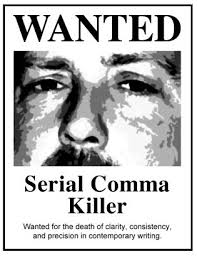Today we’re going to talk about the easiest way to use commas–in a list. In a rational world, this would be a short post indeed. But vile punctuators have actually advocated leaving out (gasp!) the Oxford comma. I’m here to see that you aren’t sucked into their decadent ways.
 First of all, you have to use commas in lists. Otherwise you sound like a psychopath: I like cooking my family and pets. Really? I would run very fast to the nearest weapon. However: I like cooking, my family, and pets–this sounds like a person you could actually sit down and shoot the breeze with without fear of deadly force.
First of all, you have to use commas in lists. Otherwise you sound like a psychopath: I like cooking my family and pets. Really? I would run very fast to the nearest weapon. However: I like cooking, my family, and pets–this sounds like a person you could actually sit down and shoot the breeze with without fear of deadly force.
So, lists. We all have them. By the way, you should minimize their use in fiction. I made this newbie mistake, too, and it’s still quite often a first draft mistake. To keep it clear, at least in your own head, you write about how the hero(ine) packed dried beef, salt, rice, beans, oats, etc. in preparation for their harrowing journey. It’s specific. It builds a mental picture. But if it doesn’t do more than that, sometimes you can just mention that they packed food and bring in the details later as they eat it. A list isn’t riveting narrative material.
And a list doesn’t just have to be single items. You can say that Cinderella swept the floors and mopped them, scrubbed the privy, washed the clothes and ironed them, and hung them in the closet by color. Just remember that a list is a summary. A list like this is a straight tell. That may be fine if you’re just getting background information out of the way, but always consider if showing it would be more effective. If you don’t want to show Cinderella’s chapped hands as she scrubs, fine. Just realize that you’re passing on it.
But every item on the list gets a comma, except for the final item, which would look silly. The last comma is known as the Oxford, Harvard, or serial comma. If Sam brings salt, spices, and pans on the road to Mordor, please, for the love of all that’s sacred, put a comma after spices. Examples: She pursed her lips, raised her eyebrows, and kicked him in the balls. Don’t leave out the comma after eyebrows. He threw hammers, wrenches, screwdrivers, and even a drill. Don’t omit the comma after screwdrivers.
Perhaps the unenlightened might think, why not? It’s not required. My seventh grade teacher told me so. She couldn’t mark it wrong on my tests, and I’d like to carry this brave victory into adulthood.
Ah, but there are more important considerations here than mere triumphs over the forces of state education. One of the reasons to use commas is when they’re necessary to prevent confusion (https://owl.english.purdue.edu/owl/owlprint/607/, rule 11). And there are times, when writing certain lists, that leaving out the final comma would indeed cause confusion. Consider the following:
 My heroes are my parents, Superman and Wonder Woman. If you leave out the comma after Superman, it appears that your parents are Superman and Wonder Woman.
My heroes are my parents, Superman and Wonder Woman. If you leave out the comma after Superman, it appears that your parents are Superman and Wonder Woman.- Highlights of his global tour include encounters with Nelson Mandela, an 800 year old demigod and a dildo collector. A single comma after demigod would make the difference between slandering Mr. Mandela or not. Apparently, this one really happened.
- Among those interviewed were Merle Haggard’s two ex-wives, Kris Kristofferson and Robert Duvall. Oh, dear. A comma after Kristofferson would have been so much clearer.
 And really, nobody needs the extra step of scrutinizing their sentences to make sure the Oxford comma is unnecessary. English is already complicated enough. Just use the Oxford comma. You can thank me for it (or not) later.
And really, nobody needs the extra step of scrutinizing their sentences to make sure the Oxford comma is unnecessary. English is already complicated enough. Just use the Oxford comma. You can thank me for it (or not) later.
And besides, you’ll be in good company. Most people who have an opinion on this subject favor the Oxford comma.
So go forth and bravely use the Oxford comma. Spread clear, concise writing throughout the world. It’s up to you. Even superheroes need help at times. 🙂






I so like this post. I am very much pro-Oxford comma. However, it seems to me that anyone who does not do much writing does not use it. I remember a superior of mine arguing with me at work over a correction I made on their paper. “You don’t put a comma before ‘and’ she said.” “That’s how I was taught, and person B agrees with me; he knows what he’s talking about.” Well… oh boy… I was taught that way, too, but I no longer follow that rule. I don’t remember if she left my edits in or not but I know she didn’t believe me and I didn’t care as my name was not going to be on that paper.
However, I have to admit that there are times when I do not recognize the need for a comma. Grammarly is there to point those out and I learn as I go.
LikeLiked by 1 person
Hey, thanks for the comment. Even though this is one of my most popular evergreen posts (in terms of visits), casual visitors rarely comment. And I love the Oxford comma, mostly because of the occasional confusing sentences like I noted above. : )
LikeLiked by 1 person